
Trump news – live: Trump blames Florida governor for Disney becoming ‘woke’ as he praises Erdogan victory
Donald Trump slammed Disney and his main rival in the 2024 GOP presidential primary, Florida Governor Ron DeSantis, claiming that he’s responsible for the entertainment giant becoming “woke”. “Disney has become a Woke and Disgusting shadow of its former self, with people actually hating it. Must go back to what it once was, or the ‘market’ will do irreparable damage,” he wrote on Truth Social. “This all happened during the Governorship of ‘Rob’ DeSanctimonious. Instead of complaining now, for publicity reasons only, he should have stopped it long ago. Would have been easy to do - Still is!” Mr Trump also congratulated Turkish President Recep Tayyip Erdogan after the leader claimed victory in Sunday’s runoff election. “Congratulations to President Recep Tayyip Erdogan on his big and well deserved victory in Turkey. I know him well, he is a friend, and have learned firsthand how much he loves his Country and the great people of Turkey, which he has lifted to a new level of prominence and respect!” Mr Trump said. Meanwhile, Texas Republicans ignored the pleas from Mr Trump and impeached their own state Attorney General Ken Paxton on charges of corruption. Read More Trump says DeSantis to blame for Disney becoming ‘woke’ and ‘disgusting’ Trump's welcome of Scott into 2024 race shows his calculus: The more GOP rivals, the better for him Ron DeSantis news – live: DeSantis sued over ‘voter suppression’ measures as Trump takes lead in new poll
2023-05-29 15:55

Ron DeSantis news – live: DeSantis sued over ‘voter suppression’ measures as Trump takes lead in new poll
Ron DeSantis is facing three new lawsuits after he signed a new law just hours before announcing his presidential campaign – legislation which makes it harder to vote in Florida. The bill allows Mr DeSantis to continue as governor in the Sunshine State as he campaigns for the White House, but it also restricts the use of mail-in ballots, attempts to make it easier to purge voting rolls, and places limits on third-party voter registration organisations, according to Mother Jones. Meanwhile, Donald Trump is leading Mr DeSantis among Republicans in California, according to a new poll. The former president has the support of 44 per cent of Republicans in the state, while Mr DeSantis has 26 per cent, according to a poll by the UC Berkeley Institute of Governmental Studies. Three months ago, Mr DeSantis led Mr Trump among likely GOP primary voters in the state by eight percentage points. Poll director Mark DiCamillo told the Los Angeles Times: “Trump dominates the news, and I think he enjoys that, and I think he gets the sense when he is dominating the news, he’s probably expanding his messaging to his base.” Read More Donald Trump Jr shares doctored Office clip showing Ron DeSantis wearing a woman’s suit DeSantis accuses Trump of ‘moving to the left’ as he tells ex-president: ‘You’ve changed’ Trump's welcome of Scott into 2024 race shows his calculus: The more GOP rivals, the better for him Disney opposes DeSantis request to disqualify judge in free speech lawsuit
2023-05-29 14:59

Trump says DeSantis to blame for Disney becoming ‘woke’ and ‘disgusting’
Donald Trump has criticised Ron DeSantis for not taking on Disney sooner, suggesting his main rival for the 2024 Republican presidential nomination could have prevented the entertainment giant from becoming – in his words – “woke” and “disgusting”. Mr Trump lashed out at both Disney and Mr DeSantis on Sunday as the Florida governor remains locked in a feud with one of America’s best-loved brands, after it opposed his so-called “Don’t Say Gay” bill. “Disney has become a Woke and Disgusting shadow of its former self, with people actually hating it. Must go back to what it once was, or the ‘market’ will do irreparable damage,” Mr Trump said. “This all happened during the Governorship of “Rob” DeSanctimonious. Instead of complaining now, for publicity reasons only, he should have stopped it long ago. Would have been easy to do - Still is!” Disney’s row with the Florida governor began when it came under pressure from employees to take a stance against a new law that prohibits school teachers from discussing gender identity and sexuality in the classroom. In retaliation, Mr DeSantis signed legislation to take away Disney’s self-governing status and appointed a new board of supervisors. Before the new board came in, the company signed agreements with the old board made up of Disney supporters that stripped the new supervisors of design and construction authority. Later, the Republican-controlled Florida Legislature passed a law to allow the DeSantis-appointed board to repeal those agreements and the theme park resort’s monorail system subject to state inspection, something it had previously done in-house. It prompted Disney to file a lawsuit against the Florida governor and his appointed board last month. It claimed in the lawsuit that it was in violation of free speech and the contracts clause. In a tit-for-tat move, the DeSantis-appointed board earlier this month sued Disney in state court in Orlando seeking to void the deals the company made with the previous board. The row has seen Disney, which provides thousands of jobs, cancel its plans to build a $1bn project to create new campus in central Florida that would have involved relocating 2,000 employees from southern California to work in digital technology, finance and product development. “We have plans to invest $17 billion and create 13,000 jobs over the next 10 years. I hope we’re able to do so.” said Josh D’Amaro, Disney’s parks chief, who said he remained optimistic about the future of Disney. Disney employs an estimated 80,000 people in Florida and is often described as operating its own kingdom within the state. Earlier this month, Mr Trump’s campaign lashed out at Mr DeSantis for getting caught in the “mouse trap” and losing jobs from the state’s largest employer. “Ron DeSanctimonious gets caught in a mouse trap,” said a tweet from Trump’s campaign account. “The Culture Of Losing Continues,” referring to Mr DeSantis’ recent string of electoral defeats. “DeSanctus’ weakness leads to job losses and loss of $1B,” the tweet added. Read More DeSantis v Disney: Why Florida’s governor is at war with the Mouse What's on DeSantis' agenda? A look at the laws he passed as Florida governor, from abortion to guns Disney opposes DeSantis request to disqualify judge in free speech lawsuit Ivanka and Jared split over attending Trump 2024 launch – follow live Why was Donald Trump impeached twice during his first term? Four big lies Trump told during his 2024 presidential announcement
2023-05-29 14:58
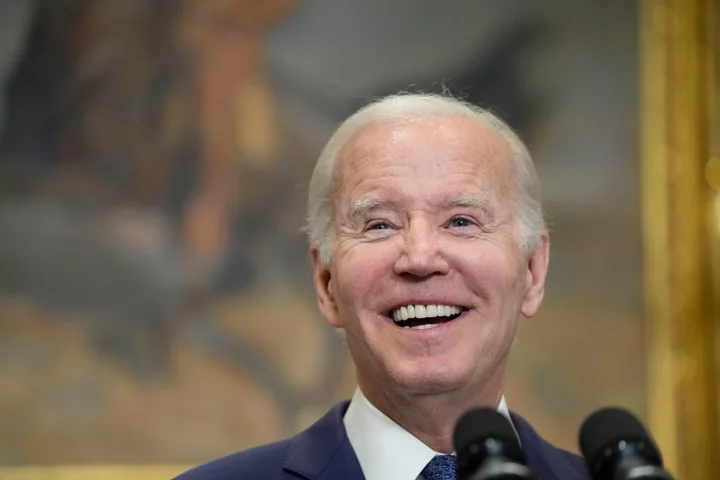
Takeaways on debt ceiling: McCarthy's balancing act, Biden's choice and the challenges ahead
It’s a deal no one in Washington claims to really like. But after weeks of negotiations, President Joe Biden and House Speaker Kevin McCarthy have struck an agreement to raise the debt ceiling and avert a potentially devastating government default. The stakes are high for both men — and now each will have to persuade lawmakers in their parties to vote for it. Treasury Secretary Janet Yellen said last week that the United States could run out of cash to pay the bills and default on its obligations if the debt ceiling is not raised by June 5. The ultimate agreement, hammered out by Biden, McCarthy and a small group of their deputies, is a two-year budget deal that would essentially hold spending flat for 2024, while boosting it for defense and veterans, and capping increases at 1% for 2025. It would suspend the debt limit until January 2025, after the next presidential election. Republicans had insisted on reducing spending and had passed their own bill with much larger cuts last month. The package would also make policy tweaks, including by adding work requirements for some food aid recipients and streamlining an environmental law that Republicans say has made it harder to build energy projects. Takeaways from the deal, and from the negotiations that led up to it: McCARTHY’S DELICATE BALANCING ACT Ever since McCarthy won the House speakership on the 15th ballot in January, it was clear that the debt ceiling negotiations would be his first and perhaps biggest test. Known more for strategy than policy, McCarthy has had a challenge that seemed almost insurmountable, with a narrow majority and a sizable group of hard-right conservatives certain to oppose anything he negotiated with Biden. And he could still find himself in the middle of a crisis if too many in his caucus revolt when the House votes on the package this week. Through it all, the Californian has exhibited his typical laid-back vibe, projecting confidence about the bill and its success. He said Sunday that he will win a majority of Republicans on the bill and some Democrats. In a conference call on Saturday night, McCarthy said, more than 95 percent of the members in his conference “were overwhelmingly excited about what they see.” But some House Republicans were publicly slamming the deal, arguing it did too little to cut the deficit. Rep. Dan Bishop of North Carolina tweeted a vomit emoji, complaining that some Republicans on the call were praising the speaker for getting what he said is “almost zippo in exchange” for the debt-ceiling hike. BIDEN’S RELUCTANT COMPROMISE For months, Biden and his aides had a mantra: There would be no negotiation on the debt limit. But then he negotiated anyway. It’s not where Biden, a veteran of the nasty 2011 debt-limit battle that saw the nation’s credit rating downgraded for the first time in history, wanted to be. But it was a likely scenario — with a Republican-controlled House that had made it clear from the start that it would not raise the borrowing authority under a Democratic president without extracting spending curbs or other policy concessions. There was no way Biden, who is running for re-election next year, would want a historic default on his watch. Biden has continued to insist that he was negotiating on the budget, not the debt ceiling. But pushed by a reporter Sunday evening who noted that was precisely what Republicans were seeking in exchange for lifting the debt limit, the president seemed to break from his talking point. “Sure, yeah,” Biden said, chuckling slightly. “Can you think of an alternative?” Now he will have to sell it to House Democrats, who must vote for it in big enough numbers to make up for defecting Republicans. Many progressive members in the House have appeared skeptical of the deal, but they remained mostly quiet over the weekend as they waited for more details. But the deal won early praise from another key Democratic group. The New Democrat Coalition, which has roughly 100 members, praised Biden as having negotiated “a viable, bipartisan solution to end this crisis.” LONG-SOUGHT GOP POLICY Republicans were able to win some policy changes they have sought for years, however modest, including on food aid. The bill would raise the age limit for existing work requirements in the Supplemental Nutrition Assistance Program, also known as food stamps. It would also create a new agency to develop and streamline environmental reviews that Republicans have complained about for decades. The new work requirements for able-bodied SNAP recipients without dependents would phase in by 2025 and expire by 2030. And a provision pushed by Biden would take some vulnerable recipients — like veterans and the homeless — off work requirements entirely. But Republicans made clear that pushing more people to work in exchange for government benefits was a major victory for them, even if mostly symbolic. The bill also would amend the National Environmental Policy Act and designate “a single lead agency” to develop environmental reviews, in hopes of streamlining the process. Republicans had hoped for a much broader permitting package that would make it easier to build and develop energy projects. But Louisiana Rep. Garret Graves, a McCarthy ally who was one of the negotiators, said the bill brings “transformational changes into the permitting and environmental review process” for the first time in four decades. SENATE QUIET, WAITING TO CLOSE McCarthy has said the House will vote on the package Wednesday. If passed, it will then head to the Democratic-led Senate where leaders will have to get agreement from all 100 members to speed up the process and avert a default by next Monday. The White House briefed Democratic senators Sunday and McCarthy briefed Republicans. But most senators remained quiet on the deal as they waited for the full text and to see if McCarthy can navigate it through the House. Senate Majority Leader Chuck Schumer, D-N.Y., and Senate Republican Leader Mitch McConnell of Kentucky cut themselves out of the negotiating process early on, saying it should be a negotiation between the White House and McCarthy. McConnell issued a statement supporting the legislation on Sunday but some in his caucus have criticized it. The two leaders will have to navigate any potential objections over the coming week as they seek to win full support to move quickly on the deal. “With Republicans like these, who needs Democrats?” tweeted Utah Sen. Mike Lee on Saturday, aligning himself with the House Republicans who say the deal is not conservative enough. Read More Ukraine war’s heaviest fight rages in east - follow live Charity boss speaks out over ‘traumatic’ encounter with royal aide Trump's welcome of Scott into 2024 race shows his calculus: The more GOP rivals, the better for him Stock market today: Asian markets mostly higher after Biden-McCarthy deal on US debt What’s in the cliffhanger deal struck by Biden and McCarthy to raise the debt limit?
2023-05-29 12:52

Turkey's Erdogan turns away reform-minded challenger to win another term
Turkish President Recep Tayyip Erdogan turned away a challenger who sought to reverse his authoritarian-leaning changes, securing five more years to oversee the country at the crossroads of Europe and Asia that plays a key role in NATO. Erdogan prevailed by winning more than 52% of the vote in Sunday's presidential runoff, which came two weeks after he fell short of scoring an outright victory in the first round. A majority of Turkish voters in the second round chose him over challenger Kemal Kilicdaroglu, showing their support for a man who they see as a strong, proven leader. Voters were divided between loyalty to Erdogan, who has ruled for two decades, and hopes for the opposition candidate, who promised to return to democratic norms, adopt more conventional economic policies and improve ties with the West. With his immediate political future secure, Erdogan must now confront skyrocketing inflation that has fueled a cost-of-living crisis and rebuild in the aftermath of a devastating earthquake that killed more than 50,000 people. In two speeches — one in Istanbul and one in Ankara — Erdogan thanked the nation for entrusting him with the presidency again. “We hope to be worthy of your trust, as we have been for 21 years,” he told supporters on a campaign bus outside his home in Istanbul. He said the divisions of the election are over, but he continued to rail against his opponent. “The only winner today is Turkey,” Erdogan said outside the presidential palace in Ankara, promising to work hard for Turkey’s second century, which he called the “Turkish century.” The country marks its centennial this year. Supreme challenges lie ahead, starting with the economy that has taken a beating from what critics view as Erdogan’s unorthodox policies. He also must tend to massive rebuilding efforts in 11 provinces hit by the Feb. 6 earthquake that leveled entire cities. Kilicdaroglu said the election was “the most unjust ever,” with all state resources mobilized for Erdogan. “We will continue to be at the forefront of this struggle until real democracy comes to our country,” he said in Ankara. He thanked the more than 25 million people who voted for him and asked them to “remain upright.” The people have shown their will "to change an authoritarian government despite all the pressures,” Kilicdaroglu said. Supporters of Erdogan, a divisive populist and masterful orator, took to the streets to celebrate, waving Turkish or ruling party flags, honking car horns and chanting his name. Celebratory gunfire was heard in several Istanbul neighborhoods. His next term is certain to include more delicate maneuvering with fellow NATO members over the future of the alliance and the war in Ukraine. Leaders across the world sent their congratulations, highlighting Turkey and Erdogan’s enlarged role in global politics. Western politicians said they are ready to continue working with Erdogan despite years of sometimes tense relations. Most imminently, Turkey holds the cards for Sweden’s hopes to join NATO. The bid aims to strengthen the military alliance against Russia and is central to the continuity of a deal to allow Ukrainian grain shipments and avert a global food crisis. “No one can look down on our nation,” Erdogan said in Istanbul. Steven A. Cook, a senior fellow at the Washington-based Council on Foreign Relations, said Turkey was likely to “move the goal post” on Sweden’s membership in NATO as it seeks demands from the United States. He also said Erdogan, who has spoken about introducing a new constitution, was likely to make an even greater push to lock in changes adopted by his conservative and religious Justice and Development Party, or AKP. In his victory remarks, Erdogan said rebuilding the quake-struck cities would be his priority. He also said a million Syrian refugees would go back to Turkish-controlled “safe zones” in Syria as part of a resettlement project being run with Qatar. Erdogan has retained the backing of conservative voters who remain devoted to him for lifting Islam’s profile in Turkey, which was founded on secular principles, and raising the country’s influence in international politics. Erdogan’s rival was a soft-mannered former civil servant who has led the pro-secular Republican People’s Party, or CHP, since 2010. The opposition took months to unite behind Kilicdaroglu. He and his party have not won any elections in which Erdogan ran. In a frantic outreach effort to nationalist voters in the runoff, Kilicdaroglu vowed to send back refugees and ruled out peace negotiations with Kurdish militants if he was elected. Erdogan and pro-government media portrayed Kilicdaroglu, who received the backing of the country’s pro-Kurdish party, as colluding with “terrorists” and supporting what they described as “deviant” LGBTQ rights. In his victory speech, Erdogan repeated those themes, saying LGBTQ people cannot “infiltrate” his ruling party or its nationalist allies. In Ankara, Erdogan voter Hacer Yalcin said Turkey’s future was bright. “Of course Erdogan is the winner ... Who else? He has made everything for us," Yalcin said. “God blesses us!” Erdogan, a 69-year-old Muslim, is set to remain in power until 2028. He transformed the presidency from a largely ceremonial role to a powerful office through a narrowly won 2017 referendum that scrapped Turkey’s parliamentary system of governance. He was the first directly elected president in 2014 and won the 2018 election that ushered in the executive presidency. The first half of Erdogan’s tenure included reforms allowing the country to begin talks to join the European Union, as well as economic growth that lifted many out of poverty. But he later moved to suppress freedoms and the media and concentrated more power in his own hands, especially after a failed coup attempt that Turkey says was orchestrated by the U.S.-based Islamic cleric Fethullah Gulen. The cleric denies involvement. In the Kurdish-majority city of Diyarbakir, 37-year-old metalworker Ahmet Koyun said: “It is sad on behalf of our people that a government with such corruption, such stains, has come into power again. Mr. Kemal would have been great for our country, at least for a change of scene." But he said everyone must accept the results. ___ Bilginsoy reported from Istanbul. Bela Szandelszky in Ankara, Turkey; Mucahit Ceylan in Diyarbakir, Turkey; and Cinar Kiper in Bodrum, Turkey, contributed to this report. Read More Ukraine war’s heaviest fight rages in east - follow live Charity boss speaks out over ‘traumatic’ encounter with royal aide Analysis: Only Erdogan knows his plans for Turkey’s future. That is the problem AP News Digest 8:40 a.m. Erdogan declared winner of Turkey presidential run-off – extending his 20-year rule
2023-05-29 12:48
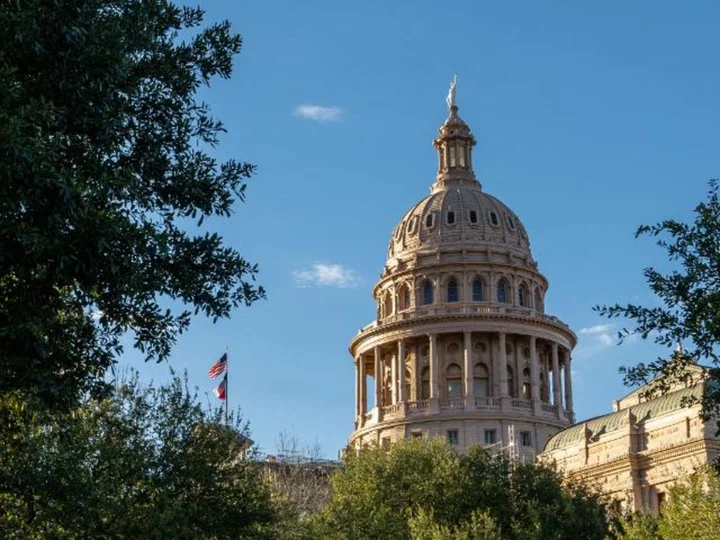
Texas Republicans pass bills targeting elections administration in Houston-area county
Texas Republicans have approved a pair of bills targeting the elections process in Harris County, the state's largest and home to Houston, with voting rights activists accusing the GOP of plotting a "power grab" in an increasingly Democratic county.
2023-05-29 09:24
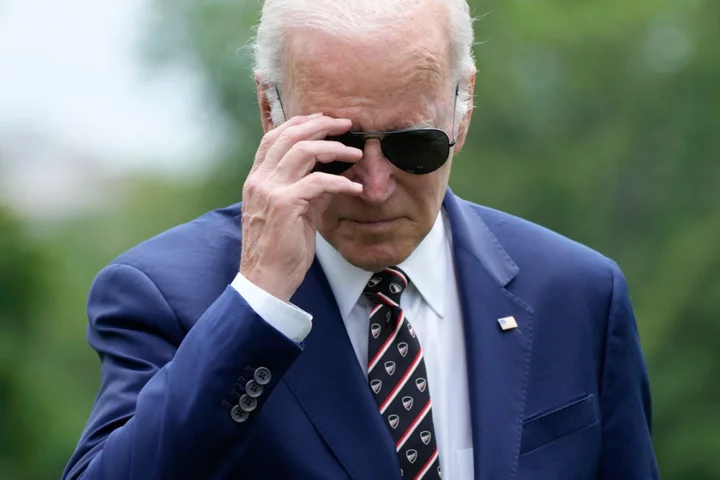
What’s in the cliffhanger deal struck by Biden and McCarthy to raise the debt limit?
Weeks of sniping back-and-forth between the White House and the Republican majority in the House of Representatives has finally yielded a deal: America will not default on its debt obligations, should Congress act and pass the legislation before Thursday. On Saturday, House Speaker Kevin McCarthy and Joe Biden announced the end of negotiations and the agreement upon a deal late into the evening, with the text of the legislation itself soon to follow. The new compromise both touches on Republican priorities while also safeguarding Joe Biden’s legislative accomplishments. But it comes after weeks of bitter fighting. Republicans accused the White House and congressional Democrats of out-of-control spending, ignoring their rivals’s derisive reminders about the debt incurred by a GOP-led tax cut passed in 2017 that largely benefited wealthier Americans. Democrats, meanwhile, blamed Republicans for holding the country’s credit rating and ability to pay its loans hostage, and for seeking cuts to social welfare programs like food assistance for needy families. As we inch closer to Thursday’s deadline, let’s take a look at what leaders in Washington have come up with to break the deadlock. No more debt drama (for now) The first and most significant achievement of this deal: it raises the debt ceiling through the end of 2024. That guarantees the GOP won’t be able to wage a fight over the issue again, particularly as the presidential campaign season heats up later this year and into the next. Any debt ceiling battle during campaign season, particularly in the summer or fall of 2024, would take Joe Biden off the campaign trail and put his focus firmly on Washington at a time when either of his likely general election opponents, Donald Trump and Ron DeSantis, would be free to continue their politicking. In total, the deal calls for raising America’s debt limit by $4 trillion. Signing away that leverage for the next year is already proving to be one of the toughest pills for congressional conservatives in both the House and Senate to swallow, especially given the lack of other major concessions in the pending legislation. Spending caps The GOP’s big win in the negotiating process, this legislation is set to freeze federal spending at the current level, with the exception of military funding, through 2024. And growth of that spending will be capped at 1 per cent if Congress cannot agree upon a stopgap spending deal in January of 2025. This is a significant restriction for the federal government over the next year, and notably puts in place much stricter spending limits than members of Congress agreed to during the last debt limit fight in 2019. The language allowing for defence spending to increase while domestic programmes face a spending freeze is already irking progressives, who have long argued that the US military’s bloated budget should be at the top of the list for reforms. Caps set by this compromise are simultaneously the biggest victory for Republicans as well as their failure; while the spending caps are certainly more than what Democrats were demanding, they also eliminate the possibility of Republicans using the debt ceiling to make real cuts to programmes already implemented by the Biden administration as part of the Inflation Reduction Act and other legislation. That means that Mr Biden’s 2021-2022 legislative agenda will remain largely intact, despite demands by conservatives to roll back huge parts of it, like efforts to forgive student loans or expand green energy production. Work requirements for food stamps One of the GOP’s efforts to stem the tide of federal spending is centred around the issue of providing food assistance to low-income families. The new legislation is set to expand work requirements for the SNAP programme from the current age cap of 49 to a new cap of 54, meaning that Americans within that age bracket will have to prove employment to receive benefits. The issue may seem oddly specific for Republicans to hold up America’s ability to pay its debts upon, but tightening the restrictions fo federal assistance has long been a target of the GOP, and originally the party wanted to expand those work requirements to Medicaid as well. The new work requirements will sunset in 2030, unless extended before then by a GOP Congress. IRS funding halted The other specific ask that Republicans managed to secure in their compromise with the White House was a halt, at least in part, to a plan to fund new hiring initiatives at the Internal Revenue Service (IRS), America’s tax collection agency. The beleaguered agency was set to receive more funding for agents that the federal government said were to assist taxpayers with filing issues and shore up the IRS’s capabilities; Republicans painted the issue instead as an effort to hire an army of IRS auditors to go after taxpayers for suspected fraud, a non-starter for the party that has long sought, particularly among its conservative wing, to diminish the power and capabilities of both the IRS and other federal agencies. But some conservatives are already complaining that the cuts aren’t enough. Congressman Chip Roy exclaimed angrily after the deal was announced that “98%” of the funding for the expansion of the IRS’s services would still go through. Covid aid The deal has one more minor win for Republicans — a provision to return Covid aid funding that has yet to be appropriated. Millions of dollars in this aid still remains unspent by the federal government, though Democrats have used it thus far to fund a number of federal health programmes which they warn could face cuts if the aid is rolled back entirely. Read More Debt ceiling agreement gets thumbs up from biz groups, jeers from some on political right President attends 2nd grandchild's graduation as daughter of Biden's late son leaves high school Democrats look set to back debt limit deal – while right-wing threatens to blow it up AP News Digest 8:40 a.m. Debt-ceiling deal: What's in and what's out of the agreement to avert US default Asylum-seekers say joy over end of Title 42 turns to anguish induced by new US rules
2023-05-29 05:53
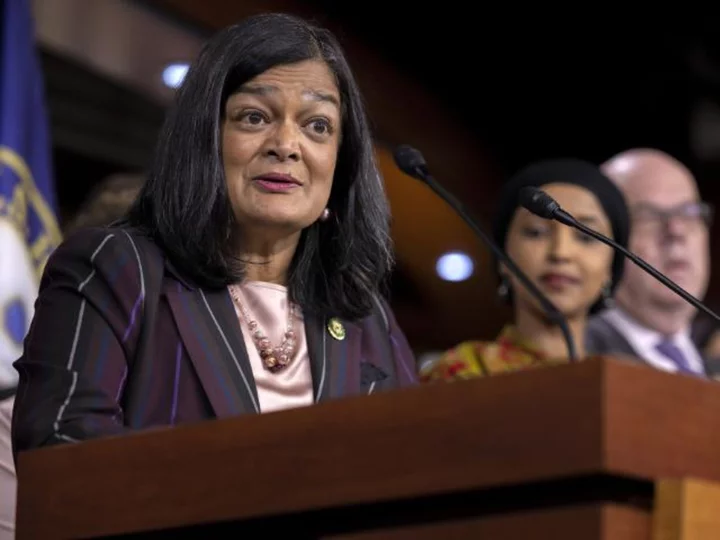
Top House progressive says Democratic leaders should be concerned about debt deal support
Washington Rep. Pramila Jayapal, the chair of the Congressional Progressive Caucus, said Sunday that White House negotiators and Democratic leaders should be concerned about progressive support for the tentative deal to raise the debt ceiling for two years
2023-05-29 02:16
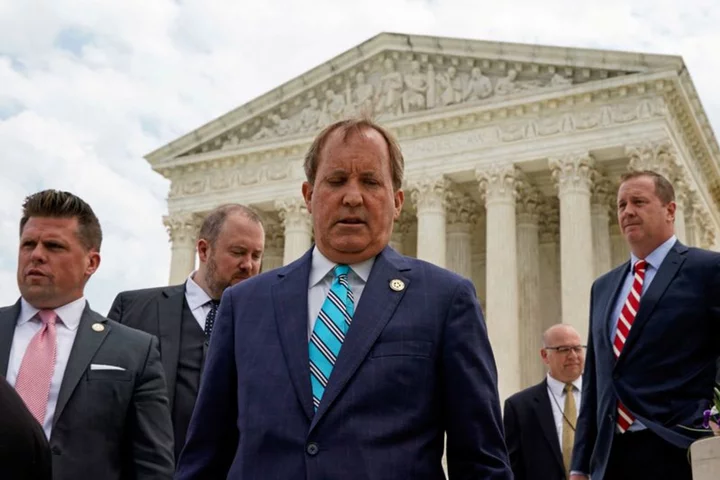
Texas Senate to deliberate on impeached AG Ken Paxton
By Rich McKay The Texas Senate on Sunday was set to begin deliberations to permanently remove from office
2023-05-29 01:29
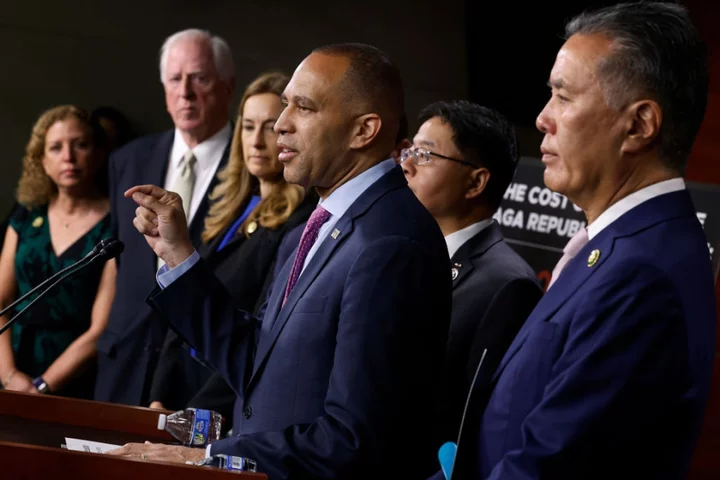
Democrats look set to back 11th hour debt ceiling deal – while GOP right-wingers threaten to blow it up
House Speaker Hakeem Jeffries sounded confident that Congress would vote to avert a default on the US’s obligations on Sunday, hours after news broke that the White House had reached a deal with Republican leadership to raise the debt ceiling. The “agreement in principle” was announced Saturday evening after much of the House of Representatives and Senate had left for the Memorial Day weekend. A handful remained in Washington to continue negotiations ahead of the deadline; the US Treasure Department estimates that the federal government’s ability to pay its debts will be in question come 1 June — this Thursday. Mr Jeffries spoke on CBS’s Face the Nation on Sunday. While he cautioned that he had not seen the actual text of the bill, which is reportedly set to cap funding for the US government (except for the military) through 2024, he offered a simple “yes” when asked directly if he could guarantee that the US would avert default. It’s a statement that will likely mean a sigh of relief for those Americans worried about the effects that a credit downgrade would have on the US economy, though that remains a possibility thanks to the toxic partisanship that brought the US to this point in the first place, but also one that may frustrate progressives and other Democrats who may see the development as Democrats giving in to the GOP’s demands. The deal does stave off further debt ceiling negotiations until 2025, but many on the left simply wish to do away with the limit altogether. And there’s already signs that many on the conservative right do not like the deal, with some even calling any legislation that raises the debt limit a non-starter. Their opposition within the GOP’s slim House majority necessitates votes from Democrats to pass this deal or any other. More follows...
2023-05-28 23:47
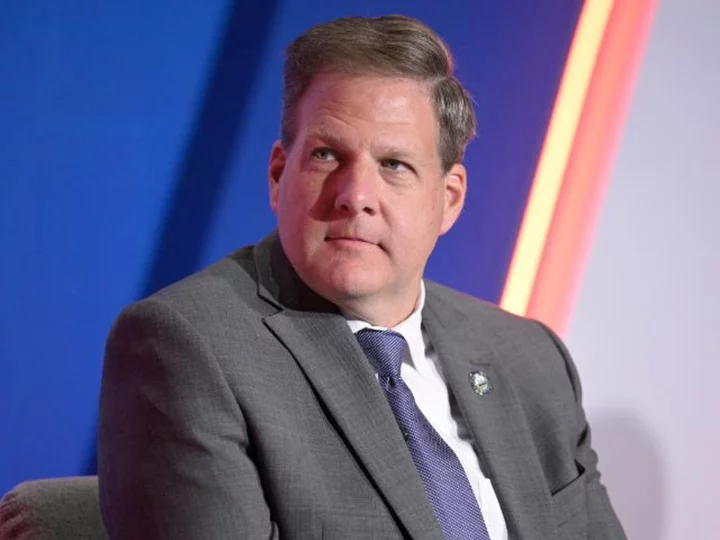
Chris Sununu will decide on 2024 presidential bid 'in the next week or two'
New Hampshire Gov. Chris Sununu will decide "in the next week or two" if he wants to mount a bid for the 2024 Republican presidential nomination.
2023-05-28 22:24
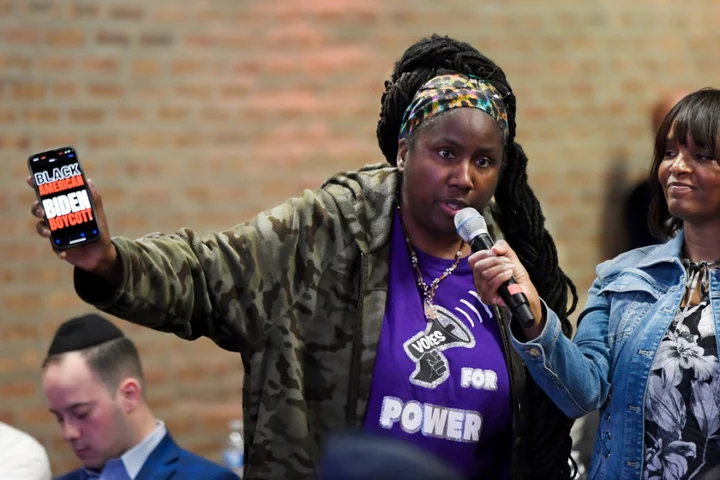
Diverse Republican presidential primary field sees an opening in 2024 with voters of color
During Donald Trump's first visit as president to Chicago, a frequent target in his attacks on urban violence, he disparaged the nation's third largest city as a haven for criminals and a national embarrassment. At a recent town hall, Republican presidential contender Vivek Ramaswamy sat alongside ex-convicts on the city's South Side and promised to defend Trump's “America First” agenda. In return, the little-known White House hopeful, a child of Indian immigrants, found a flicker of acceptance in a room full of Black and brown voters. The audience nodded when Ramaswamy said that “anti-Black racism is on the rise,” even if they took issue with his promise to eliminate affirmative action and fight “woke” policies. “America First applies to all Americans — not just the few that Republicans talk to,” he said. Race has emerged as a central issue — and a delicate one — in the 2024 presidential contest as the GOP's primary field so far features four candidates of color, making it among the most racially diverse ever. South Carolina Sen. Tim Scott, the first Black senator in the South since Reconstruction, entered the contest earlier in the month. He joined Nikki Haley, a former South Carolina governor and U.N. ambassador who is of Indian descent, and Larry Elder, an African American raised in Los Angeles' South Central neighborhood who came to national attention as a candidate in the failed effort two years ago to recall California Gov. Gavin Newsom. Miami Mayor Francis Suarez, who is of Cuban descent, says he may enter the race in the coming days. Most of the candidates of color are considered underdogs in a field currently dominated by Trump and Florida Gov. Ron DeSantis. Yet the party’s increasingly diverse leadership, backed by evolving politics on issues such as immigration, suggest the GOP may have a real opportunity in 2024 to further weaken the Democrats’ grip on African Americans and Latinos. Those groups have been among the most loyal segments of the Democratic coalition since Republican leaders fought against the Civil Rights Act of 1964. The Republican presidential contenders of 2024 walk a fine line when addressing race with the GOP’s overwhelmingly white primary electorate. In most cases, the diverse candidates in the Republican field play down the significance of their racial heritage. They all deny the existence of systemic racism in the United States even while discussing their own personal experience with racial discrimination. They oppose policies around policing, voting rights and education that are specifically designed to benefit disadvantaged communities and combat structural racism. The NAACP recently issued a travel advisory for the state of Florida under DeSantis' leadership, warning of open hostility “toward African Americans, people of color and LGBTQ+ individuals.” The notice calls out new policies enacted by the governor that include blocking public schools from teaching students about systemic racism and defunding programs aimed at diversity, equity and inclusion. The Republican presidential candidates of color largely support DeSantis' positions. Marc Morial, president and CEO of the National Urban League, said the GOP’s policies are far more important than the racial and ethnic diversity of their presidential candidates. He noted there also were four Republican candidates of color in 2016, the year Trump won the White House after exploiting tensions over race and immigration. “White nationalists, insurrectionists and white supremacists seem to find comfort in the (Republican) Party,” Morial said. “I think we’re beyond the politics of just the face of a person of color by itself appealing to people of color. What do you stand for?” With few exceptions, the Republican candidates who have entered the presidential primary field have embraced the GOP's “anti-woke” agenda, which is based on the notion that policies designed to address systemic inequities related to race, gender or sexuality are inherently unfair or even dangerous. DeSantis this past week described such policies as “cultural Marxism.” Still, the GOP's diverse field is not ignoring race. Indeed, some candidates are making their race a central theme in their appeal to Republican primary voters even as they deny that people of color face systemic challenges. Scott insisted that America is not a racist country in his recent announcement speech. “We are not defined by the color of our skin. We are defined by the content of our character. And if anyone tells you anything different, they’re lying,” he said. In her announcement video, Haley noted that she was raised in a small town in South Carolina as “the proud daughter of Indian immigrants — not black, not white, I was different.” Like Scott, she has defended the GOP against charges of racism. “Some think our ideas are not just wrong, but racist and evil," Haley said. "Nothing could be further from the truth." Elder is quick to criticize the Democrats’ “woke” agenda, Black Lives Matter and the notion of systemic racism. Critics say such messages are actually designed to win over suburban white voters more than to attract voters of color. But on the South Side of Chicago on a recent Friday afternoon, there were signs that some Black voters were open to the GOP's new messengers, given their frustration with both political parties. One attendee at Ramaswamy's town hall waved a flyer for a “Biden boycott” because the Democratic president has not signaled whether he supports reparations for the descendants of slaves, although Biden did back a congressional effort to study the issue. None of the GOP's presidential candidates supports reparations, either. Others condemned Democrats, in Chicago and in Washington, for working harder to help immigrants who are in the country illegally than struggling African American citizens. Federal officials were preparing to relocate hundreds of migrants from the U.S.-Mexico border to the South Side, even as many local residents struggled with violence and difficult economic conditions. “It is certainly true that there are multiple shades of melanin in this Republican race,” Ramaswamy said in an interview before the event. “I think that in some ways dispels the myth that much of the left will perpetuate that this is somehow you know, a racist party or whatever drivel.” He added: “But personally, I could care less what someone’s skin color is. I think what matters is, what are they going to accomplish? What’s their vision?” As of now, the GOP does not have any Hispanic candidates in the 2024 contest. But Suarez, the Miami mayor, said he may change that in the coming days. “I think it’s important the field does have candidates that can connect with and motivate Hispanics to continue a trend that's already happening,” he said in an interview, noting that he's “very strongly” considering a White House bid. “Democrats have failed miserably to connect with Hispanics." A majority of Latino voters supported Biden in the 2020 presidential contest, according to AP VoteCast, an extensive national survey of the electorate. But Trump cut into that support in some competitive states, including Florida and Nevada, revealing important shifts among Latinos from many different cultural backgrounds. In last fall's midterm elections, support grew for Republican candidates among Black voters, although they remained overwhelmingly supportive of Democrats, AP Votecast found. Overall, Republican candidates were backed by 14% of Black voters, compared with 8% in the midterm elections four years earlier. While the shifts may be relatively small, strategists in both parties acknowledge that any shift is significant given how close some elections may be in 2024. In Chicago, Tyrone Muhammad, who leads Ex-Cons for Social Change, lashed out at Republicans for being “losers” for not seizing a very real opportunity to win over more African Americans. While sitting next to Ramaswamy on stage, he also declared that the Republican Party is racist. Later, he said he actually voted for Trump in 2020 because Trump enacted a criminal justice bill that aimed to shorten prison sentences for nonviolent drug offenders and address racial inequalities in the justice system. While the GOP has since embraced tough-on-crime rhetoric, Muhammed noted that Biden as a senator helped pass the 1994 crime bill that led to the mass incarceration of Black people. Muhammad said he might vote Republican again in 2024, despite the party's shortcomings. He pointed to the GOP's fight against illegal immigration as a core reason for support. “I may not like you as an individual, but I like your issues, I like your policies," he said. ___ Fields reported from Washington. Associated Press writer Thomas Beaumont in Des Moines, Iowa, contributed to this report. ___ The Associated Press receives support from several private foundations to enhance its explanatory coverage of elections and democracy. See more about AP’s democracy initiative here. The AP is solely responsible for all content. Read More Ukraine war’s heaviest fight rages in east - follow live Charity boss speaks out over ‘traumatic’ encounter with royal aide AP News Digest 8:40 a.m. Asylum-seekers say joy over end of Title 42 turns to anguish induced by new US rules Why Texas Attorney General Ken Paxton's impeachment fight isn't finished yet
2023-05-28 21:29
